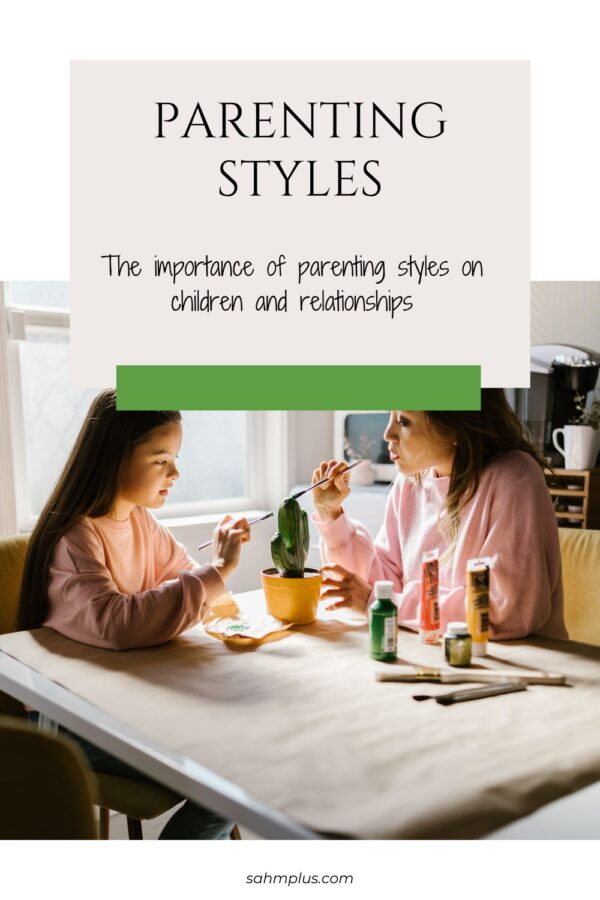It can be hard to feel as though we’re doing anything right as parents and as though we’re bound to mess our kids up. Knowing the importance of parenting styles, and thus understanding yours, can help fuel personal growth and set you on the right track for better parenting.
The way we raise our little ones shapes who they become as they grow. Parenting isn’t just about setting rules. We also need to mold their values and personalities, too.
Picture this: authoritative parents are all about that sweet balance of love and boundaries, leading to confident and high-achieving kids. But those authoritarian or neglectful styles? They can sometimes result in kiddos feeling unsure of themselves and struggling to make friends.
And get this, the effects of parenting styles stick around long after the terrible twos! Studies suggest that how we raise our kids can influence their relationships and decision-making skills well into adulthood. Crazy, right?

Why Parenting Styles Are Important
Parenting styles play a crucial role in shaping a child’s personality, values, and overall well-being. The way parents interact with their children has a profound impact on their emotional and social development.
The parenting style adopted by parents can either nurture or hinder a child’s growth. For instance, authoritative parenting, characterized by warmth, support, and clear boundaries, has been found to have positive effects on a child’s self-esteem and academic performance. On the other hand, authoritarian or neglectful parenting styles can lead to negative outcomes such as low self-esteem and poor social skills.
The influence of parenting styles extends beyond childhood and into adulthood. Research suggests that the long-term effects of parenting styles can shape an individual’s relationships, decision-making abilities, and mental health later in life.
Parents need to be aware of the impact their parenting style can have on their child’s development. By fostering a nurturing environment that promotes open communication, empathy, and respect for boundaries, parents can help cultivate positive traits in their children that will benefit them throughout their lives.
Importance of Parenting Styles and Child Development
Research has shown that different parenting styles can have varying effects on child development. These include:
- Authoritative Parenting:
- Warmth, support, and clear boundaries.
- Linked to higher self-esteem and improved social skills.
- Authoritarian Parenting:
- Strict and controlling approach.
- May result in lower self-esteem and social difficulties.
- Permissive Parenting:
- Lax rules and minimal discipline.
- Can lead to challenges with self-control and responsibility.
- Neglectful Parenting:
- Lack of emotional involvement and attention.
- Potentially harmful effects on emotional development.
Understanding the impact of different parenting styles on child development is essential for parents to make informed choices about how they raise their children. By adopting an authoritative approach that balances warmth with clear expectations and consistent discipline, parents can create an environment that promotes healthy growth and development for their children.
How Parenting Styles Affect Child Behavior
Each parenting style has its unique influence on child behavior. Here are a few examples about how parenting styles affect child behavior:
- Authoritarian parents:
- Tend to be strict and demanding, setting high expectations.
- Can lead to obedient but potentially anxious or rebellious behavior in children.
- Authoritative parents:
- Strike a balance between setting rules and being responsive to their child’s needs.
- Guide while encouraging independence and open communication, leading to well-adjusted children with self-control and social competence.
- Permissive parents:
- Are more lenient with rules and discipline, allowing greater freedom for their children.
- This approach may foster creativity and self-expression but can lead to impulsive or entitled behavior if boundaries are not established.
- Uninvolved parents:
- Show little interest or involvement in their child’s life.
- This neglectful approach can result in children struggling with emotional regulation or exhibiting attention-seeking behaviors.
Consistent discipline and communication are key factors that influence child behavior across all parenting styles. When discipline is fair, consistent, and age-appropriate, it helps children understand boundaries and develop self-discipline. Effective communication between parent and child fosters trust, empathy, problem-solving skills, and emotional regulation.
Understanding how different parenting styles shape child behavior allows us to reflect on our approach as caregivers. By incorporating consistent discipline techniques alongside open lines of communication with our children, we can create an environment that promotes positive behaviors while nurturing their emotional well-being.
How Do Parenting Styles Affect Education?
Your parenting style significantly impacts your child’s academic performance. While warm and supportive approaches tend to foster motivation and achievement, stricter styles can create fear and hinder curiosity. Similarly, overly lenient or uninvolved parenting may lead to a lack of discipline and support, potentially affecting your child’s educational development. Recognizing your influence is crucial for nurturing a positive attitude towards learning in your child.
Parenting Styles and Academic Performance
The role of parenting styles in fostering academic motivation is a topic of great interest and importance. Research has shown that the way parents interact with their children and the parenting style they adopt can have a significant impact on their educational success.
Different parenting styles have been studied in relation to academic performance. The connection between these parenting styles and educational success is complex and multifaceted. The following parenting styles and their impact on academic performance is summarized here:
- Authoritative parenting:
- Characterized by warmth, supportiveness, clear expectations, and open communication.
- Positively associated with higher levels of academic motivation and achievement.
- Promotes autonomy in children while providing structure and guidance.
- Authoritarian parenting:
- Characterized by strict rules, high demands for obedience, and limited emotional support or warmth.
- Linked to lower levels of academic motivation.
- Children may feel pressured to perform well academically but lack intrinsic motivation or a sense of autonomy.
- Permissive parenting:
- Involves low demands for behavior control and high levels of warmth and support.
- May foster positive parent-child relationships.
- Can lead to lower academic achievement due to a lack of structure or discipline.
- Neglectful parenting:
- Refers to a lack of involvement or attention from parents towards their children’s needs.
- Consistently associated with poorer educational outcomes.
- Often results in limited support or guidance for academic pursuits.
Understanding the connection between different parenting styles and educational success can help parents become more aware of their approaches and make informed decisions about how they interact with their children. By fostering an authoritative style that combines warmth with clear expectations and open communication channels, parents can create an environment that promotes academic motivation in their children.
Effects of Different Parenting Styles on Learning
The way parents approach their role in shaping their children’s learning experiences can have a profound impact on their attitude towards education. Different parenting styles can either hinder or encourage a child’s educational growth.
- Authoritarian parenting:
- May create a fear-based environment that stifles a child’s curiosity and creativity.
- Focuses on obedience rather than fostering independent thinking and problem-solving skills.
- Children may develop a negative attitude toward learning, viewing it as an obligation rather than an opportunity for personal growth.
- Permissive parenting:
- Involves minimal rules and little structure.
- Can lead to struggles with self-discipline and lack of motivation in educational activities.
- May hinder the development of study habits and organizational skills necessary for academic success.
- Uninvolved parenting:
- Characterized by emotional detachment and minimal support or guidance.
- Can lead to feelings of neglect or abandonment in the child.
- Children may struggle academically and develop low self-esteem regarding their abilities.
- Authoritative parenting:
- Strikes a balance between setting clear expectations and providing emotional support.
- Promotes independence while offering guidance when needed.
- Children raised under this style tend to have higher levels of motivation and engagement in their educational pursuits.
Ultimately, parents need to recognize their influence on their child’s attitude toward learning. Adopting supportive approaches that foster curiosity, critical thinking skills, and intrinsic motivation in education from an early age onwards will greatly benefit the child’s overall educational growth and development.
Parenting Styles and Their Impact on Marriage
You know, parenting styles can be a real game-changer for a marriage. They’re like the secret sauce that flavors the whole parenting stew.
Imagine this: when you and your partner are on the same page about how to handle the kids, it’s like having a superpower! It can bring you closer and make the whole parenting gig a lot smoother.
But hey, we all know that agreeing on everything isn’t always a piece of cake, right? Sometimes, our upbringing and experiences can sneak in and affect how we parent. That’s why having open, honest conversations about parenting styles is key. It’s not about who’s right or wrong; it’s about finding that sweet spot where both of your parenting styles can mesh together like a perfectly choreographed dance.
Remember, teamwork makes the dream work, especially when it comes to raising those little rascals! So, keep the communication flowing and support each other as you navigate this wild and wonderful journey called parenthood.
So, here’s the deal: picking the right style is like laying the groundwork for their whole childhood. It’s super important.
But don’t worry if you’re not an expert yet. There’s always more to learn and try. Keep exploring, keep experimenting, and keep being the amazing parent you are!
Now go give those kiddos a big hug and keep rocking that parenting game!
Additional Resources
Now that you’re aware of the importance of parenting styles, we would like to encourage you to check out the following resources to help you improve your parenting skills:
- “Parenting with Love and Logic” by Foster Cline and Jim Fay – This book is like a bible for many parents, teaching how to raise self-confident, motivated children.
- Positive Parenting Program (Triple P) – A fabulous program that offers practical, proven strategies for handling everything from tantrums to bedtime battles.
- “The Whole-Brain Child” by Daniel J. Siegel and Tina Payne Bryson – It’s not just about parenting; it’s about understanding how your child’s brain works and using that knowledge to navigate the ups and downs of childhood.
- Circle of Security – This program focuses on building strong parent-child attachments, laying the foundation for healthy relationships later in life.
Articles In Our Parenting Styles Series
- 4 Parenting Styles & What They Mean for Your Family
- Why Are Parenting Styles Important?
- How to Agree on Parenting Styles When Your Differences Hurt Your Marriage
- The More Children You Have, The More Your Parenting Style Changes
- Top Tips to Help You Change Your Parenting Style

